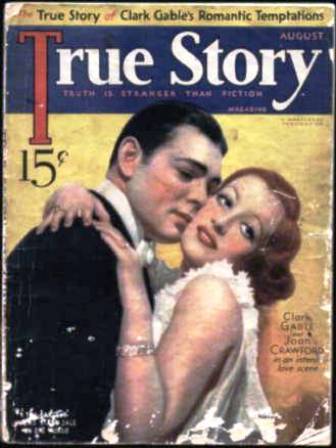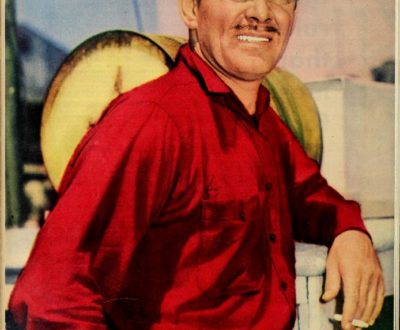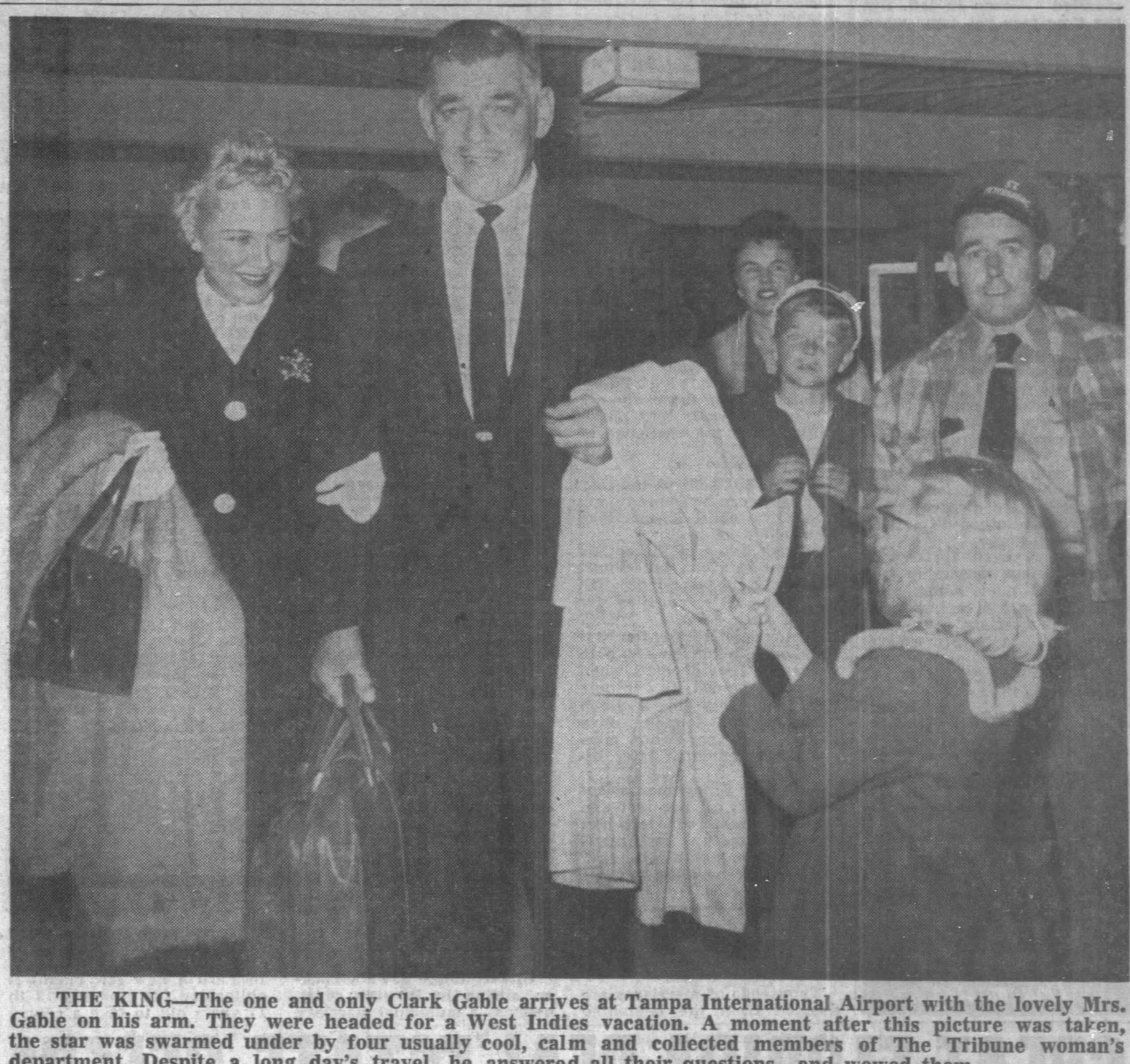{New Article} 1933: The True Story of Clark Gable’s Romantic Temptations
Whew. I usually don’t mind typing articles for the site; in fact I like it. This particular article was quite a chore, however. First of all, the magazine is in very bad shape and was literally falling to pieces in my hands. The dust from the crumbling newsprint is probably toxic and made my eyes itch. So the only way I could type it was to photocopy it and type it from there. Secondly, the writing is quite tedious and the article is the longest I have come across! And probably mostly fictional, but I digress…
This piece is from 1933 and appeared in True Story magazine. True Story wasn’t a Hollywood fan magazine, it was more of a Reader’s Digest-type collection of stories. Back in those days, magazines only needed a seed of truth and then could pretty much spin whatever story they wanted to. As is evident in this article, a loooooong (7,202 words, but who’s counting), mostly fictional semi-biography peppered with unnecessary look-at-me-I’m-such-a-great-writer musings.
Since it’s 1933, the article devotes much of its focus on his marriage to Josephine Dillon.
Thus it was that Josephine Dillon came to fill his thoughts in every waking moment, and to go with him into his dreams at night.
Probably, had they met in ordinary circumstances, there would have been no love story, no sad and unhappy marriage for them both. The difference in years would have warned them of disaster, a difference which might make no difference later but was bound to work ill for a boy in his early twenties. The fact that he did not really love her would have been plain to Josephine, and she was a wise and even a noble woman. It might also have been vitally plain to Clark who, even then, knew something of passion and its hold.
But day by day for months, they met in the enchanted circle of their mutual love—their mutual dreams. They did not meet as a young man and a middle-aged woman, depending only upon themselves for something to awaken love and promise it a future. Their common Muse, the goddess of the art of acting, their common temple of worship, the theater, ruled their lives; not the little blind Cupid and his playground.
They did not know how little they had in common because that one great bond filled their lives.
Many dramatic pupils had passed through Josephine Dillon’s capable hands. There was no finer dramatic teacher in the West; and even in New York her name was known and her ability respected. She had the real art of teaching, and she was tireless because she was inspired. In this big, awkward, intense boy she found what she had long been seeking, not actually a lover, not a husband, though was to become both, but a pupil who could be made into a great actor.
It spins quite a romantic tale of Clark and Josephine, when really their marriage was not complicated: she was his teacher, he yearned to learn, they had to travel together and live together because they were poor, and the only way they could do that is if they were married. This is during the period of time though, that Josephine maintained her “innocent and loving first wife” persona which quickly faded in the 1950’s when she stopped receiving money from his paychecks and decided he was ungrateful to her.
At last she felt that he was ready; that he must now begin his real experience. He must go to Los Angeles, the dramatic center of the West, and get work in the theater to prepare for his final attack upon the citadel of Broadway. Thus it will be seen how she had crystallized those vague and youthful plans and ambitions which had torn Clark Gable from the farm, from his father’s oil fields, and sent him to starve and struggle on the hard road to theatrical success.
Josephine Dillon realized that she had done all she could; that he must now have actual stage work to do him any good, and she sent him on his way, wondering perhaps when she would see him again, parting from him with a very heavy heart.
But Clark missed her terribly. He knew no one in Los Angeles. No one in the theater there. For so long he had been used to her daily companionship, to the spur of her ambition and confidence. He missed the enchanting—and enchanted—voice, telling him how great he was going to be one day.
He got a very small job in one of the Los Angeles companies, but no one paid any attention to him except to bawl him out occasionally.
And so, in absence, his affection for the woman who had been his best friend grew, and he wrote and told her all about it, in a boyish, funny, hurt and rather bewildered letter. It seems difficult now to connect that lonely, bewildered young man with the dynamic, poised and charming screen star of today, but those things he gained later.
When she received that letter, Josephine Dillon closed her dramatic school, rang down the final curtain on the Little Theater, and followed Clark Gable to Los Angeles.
Clark was glad to see her; gladder than he had ever been to see any one in his life. They had little or no money—dramatic schools are seldom gold mines. They were always together.
Just how it came about perhaps they, themselves, hardly knew, but suddenly it seemed natural for Clark to ask her to marry him, and for her to say she would.
Clark had a job then, was playing a walk-on part in Jane Cowl’s company of “Romeo and Juliet.” And so one day in June, 1924, before a matinee, he and Josephine Dillon were quietly married. The newspapers, not being able to see into the future, did not comment upon the event.
Well, they were married in December, not June, and I am doubtful that the whole event was that romantic. From what I understand it was more of a business deal.
No woman of the American stage has ever possessed more attraction than Pauline Frederick. In the theater she had always great artistry. Outside it, she, as the modern phrase goes, “had everything.” Her beauty was a legend. Her wit part of theatrical history. Moreover, as all who ever knew her testify, she had simplicity and sweetness and the most delightful joy in living.
Of course she was the star, and Clark Gable was only a very minor member of her company, playing small bits that didn’t matter. She was also an experienced woman of the world, who had been several times married, who had been adored by famous and brilliant men, men of vast fortune, men of the theater and men of the social registers. And up to that time Clark Gable’s experience with women hadn’t been very great.
But after all, Clark Gable was Clark Gable, the same Clark Gable who, only a few years later, was to follow in the footsteps of Rudolph Valentino. Undiscovered as yet by woman fans, by audiences or producers, he was nevertheless Clark Gable.
Naturally enough, he went crazy over Pauline Frederick.
He was sore disillusioned, terribly unhappy. The glamour had faded from life. He had just gone through a domestic tragedy and he was sick at heart, sick of domesticity, sick of the sordidness that must leave its sediment after almost every unsuccessful marriage. He wanted to forget, he wanted to reach out once more and touch the glittering garment of romance.
There, where he could see her and talk to her every day, was the most attractive woman he had ever met. Pauline Frederick was free of all those things which had lately dragged him into reality—free of hurt, of heartache, of distress and failure. She was a glamorous, successful, brilliant figure, and a beautiful woman.
I’m not sure how true this relationship with Pauline Frederick is. It’s possible, but since this article is full of romatic fluff, I am inclined to think it is exaggerated.
The most interesting part of this article is that it hints at his affair with Joan Crawford, something that was frantically hidden by MGM’s publicity department.
There can be no question that the greatest temptation of Clark Gable’s life was Joan Crawford. The real fade-out of Joan’s marriage to young Douglas Fairbanks came when Joan surrendered to the charm that was to make Clark Gable the greatest matinee idol of his generation, though the actual separation did not come until much later, and by that time the flame which threatened to consume them both had died to ashes.
I like that they call him “the greatest matinee of his generation”! Before his Oscar, before GWTW, before his official title of “King.” A little presumptious, but I think it turned out to be a true prediction!
When I got to the end of the article, I found the last paragraph said thus:
This amazing human document, revealing the deep emotional conflicts in the life of the screen’s greatest lover, is continued in the September TRUE STORY Magazine—On Sale Everywhere August 4th!
Oh my. I am going to need to rest my pre-carpal tunnel hands before I tackle that!
You can read the article in its entirety in The Article Archive. You might need a bathroom break halfway through…




One Comment
The Lady Eve
That is some fairly purple prose! I agree that the most interesting part is that which hints at Gable’s romance with Joan Crawford. I’m not a huge fan of hers but who can help but envy her position – caught between Douglas Fairbanks Jr. and Clark Gable…